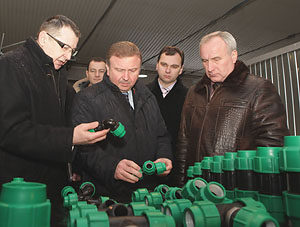Ru
|
Eng
Belarus' government to assist Kokhanovo Pipe Plant with new technologies
26.01.2015

The Belarusian government is ready to provide support to OOO Kochanovo Pipe Plant Beltrubplast with the assimilation of innovative technologies, Prime Minister Andrei Kobyakov said during a working visit to Vitebsk Oblast on 24 January, BelTA has learned.
As the Prime Minister noted, the plant has a good team of professionals and produces import-substituting goods. The company is not standing still. Every year it launches new investment projects. Its products are used primarily in the sewage systems. Belarus still imports a large number of local treatment facilities which cost a lot. The plant has offered to solve this problem mainly through the use of its own goods.
The plant is working on another interesting project: how to sanitize big-diameter pipes without dismantling and digging them out, and in some cases without interrupting the operation of the networks while giving them a new quality by providing the warranty service life up to 50 years. "This is a very promising project, and, I think, we will assist the plant with the practical assimilation of these technologies in our country," said Andrei Kobyakov.
OOO Kokhanovo Pipe Plant Beltrubplast is foreign-owned, with 94.7% of its shares belonging to Polyplastic Group, Eastern Europe's largest manufacturer of plastic pipes and fittings. The plant manufactures polythene smooth pipes (drinking water, gas, technical pipes), fittings and couplings for pipes, hydraulic tools for mounting heat pipes. The plant has started producing compression fittings, which have no analogues in Belarus and abroad.
The product range is more than 3,000 items. The plant sells products domestically and internationally (Russia, Ukraine, and Kazakhstan). In 2014, the company utilized more Br9 billion of investments in fixed capital. The company's development plan for the coming years provides for the increase in the production, primarily through the assimilation of modern technologies, equipment, and advanced methods of labor organization.
As the Prime Minister noted, the plant has a good team of professionals and produces import-substituting goods. The company is not standing still. Every year it launches new investment projects. Its products are used primarily in the sewage systems. Belarus still imports a large number of local treatment facilities which cost a lot. The plant has offered to solve this problem mainly through the use of its own goods.
The plant is working on another interesting project: how to sanitize big-diameter pipes without dismantling and digging them out, and in some cases without interrupting the operation of the networks while giving them a new quality by providing the warranty service life up to 50 years. "This is a very promising project, and, I think, we will assist the plant with the practical assimilation of these technologies in our country," said Andrei Kobyakov.
OOO Kokhanovo Pipe Plant Beltrubplast is foreign-owned, with 94.7% of its shares belonging to Polyplastic Group, Eastern Europe's largest manufacturer of plastic pipes and fittings. The plant manufactures polythene smooth pipes (drinking water, gas, technical pipes), fittings and couplings for pipes, hydraulic tools for mounting heat pipes. The plant has started producing compression fittings, which have no analogues in Belarus and abroad.
The product range is more than 3,000 items. The plant sells products domestically and internationally (Russia, Ukraine, and Kazakhstan). In 2014, the company utilized more Br9 billion of investments in fixed capital. The company's development plan for the coming years provides for the increase in the production, primarily through the assimilation of modern technologies, equipment, and advanced methods of labor organization.
SCIENCE. TECHNOLOGY. INNOVATIONS
13.08.2024
28.06.2024
28.06.2024
25.06.2024
05.06.2024
15.05.2024
15.05.2024
26.04.2024
26.04.2024
26.04.2024













